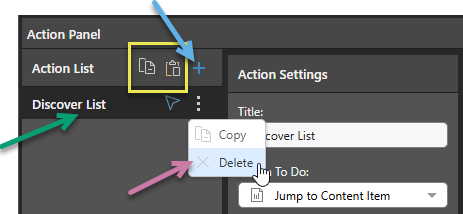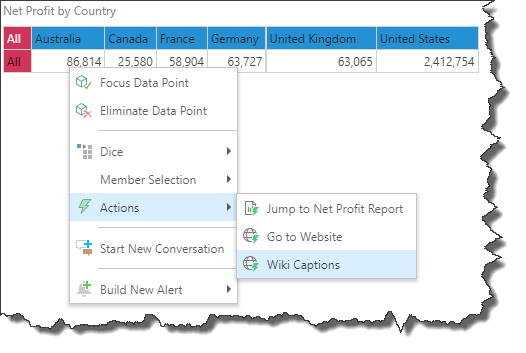Review this section to learn how to navigate the Action panel and configure dynamic actions for your discoveries.
The Actions panel is used to configure new actions, and to edit and delete existing actions.
Configuring Actions
Opening the Actions Panel
To open the Action panel, click Actions from the Home ribbon:

The Action panel opens at the bottom of the page.
Action Panel
Action List
The Action List shows all of the actions associated with this discovery.

You can:
- Add actions to the Action List using the Plus icon (blue arrow above). Once clicked, you need to create the details of your new Action as described below.
- Delete an action from the list by opening its context menu and clicking Delete (purple arrow).
- Edit an existing action by selecting the name of the action in the list and updating its details in the panel.
Copy Actions between Items
You can also replicate the same action or actions across multiple discoveries and publications using the copy and paste functions (yellow highlight above). Copy one or all actions to your clipboard, then paste the actions to the Action List of your target discovery or publication.
Action To Do
Select the type of Action that you want to create from the Action To Do drop-down in the Action Settings panel:

Jump to Content Item
Open a discovery or presentation from the Action context menu or one of the other Run From options. When you use this action to open a report, you can inject filter parameters from the clicked Target Element.
- Click here for more information
Jump to URL
Select this item if the desired action is to open a URL. When the Target Element is selected, the dynamic PQL function associated with this action is used to produce and then open a URL.
- Click here for more information
Execute JavaScript
When the Target Element is selected, a JavaScript function is executed in the Browser. To create an action that executes JavaScript, write an expression in PQL in the text editor; the output when the action is selected will be JavaScript.
- Click here for more information
Tooltip
Create a tooltip that displays a specified discovery or presentation on hover. The report shown in the tooltip can be set according to the measures in the current query.
- Click here for more information
Execute Actions
You can access actions through the Actions context menu, which opens through right-click on a desktop or a long tap on a mobile (where the action is a supported type):

For Jump to Content Item, Jump to URL, and Execute JavaScript actions, you may also be able to run the Action "on click." That is, you may also be able to run the action when you Click or Tap, Double-click, or Alt+click the Trigger Element. The click action is configured using the Run From attribute.
Tip: For a worked example describing the creation of a "Wiki Captions" action, see Jump to URL Example.
Related information
In addition to defining Actions in discoveries, you can also define them in presentations. For details about adding actions to your presentation, see Creating Actions in Present Pro.